Proposed School Management Strategies to Strengthen the Consciousness and Practices of Students to Reduce Global Warming
DOI:
https://doi.org/10.14456/educu.2020.37Keywords:
school management, strengthen the consciousness and practices, global warmingAbstract
The objectives of this research are 1) to study the framework of strengthening the consciousness and practices of students’ awareness about global warming 2) to study how school management strengthens the consciousness and practices for students well as analyzing weaknesses, opportunities and treats of the management committee.
This mixed method research collected data from 395 primary schools under the office of the Basic Education Commission. The instruments used in this study were questionnaires and the strategic evaluation form to testify feasibility and appropriateness.
The results showed that 1) the framework consists of two school management committees: Academic Affair and General Management committee and the committee to strengthen the consciousness and practices of students to reduce global warming: 2) Generally, the current state of management was considered to be in the middle level (M = 3.349 ). Looking into each aspect, how facility management and learning center effects the consciousness and practices was considered to be in the highest average (M = 3.553). The desirable state of management was performed at a high level (M = 3.839 as a whole). While considering each aspect, facility management and learning center had the high average (M = 3.946). 3) The strength of management was learning and facility environment and school learning center, while the weakness of management was curriculum development, measurement and evaluation and the student affair. The opportunities for management committee were government policy and society. While the threats for management to were the economy and technology.
References
กระทรวงศึกษาธิการ. (2551). หลักสูตรแกนกลางการศึกษาขั้นพื้นฐาน พุทธศักราช 2551. สหกรณ์การเกษตรประเทศไทย.
กุลกานต์ ฤทธิ์ฤาชัย รัตนวราหะ. (2560). Day care พื้นฐานปฐมวัย (ตอนที่ 2) ถามครูพ่อแม่พร้อม ลูกพร้อม. ถามครู.com. http://taamkru.com/th/DayCare
ชัยวัฒน์ คุประตกุล. (2551). โลกร้อน เรื่องร้อนของโลก. สถาพรบุ๊คส์.
ฐิตินันท์ ศรีสถิต. (2550). โลกร้อนทุกสิ่งที่เราทำเปลี่ยนแปลงโลกเสมอ. ภาพพิมพ์.
พฤทธิ์ ศิริบรรณพิทักษ์. (2553). การจัดการศึกษาเพื่อการพัฒนาที่ยั่งยืน: พื้นฐานการศึกษาด้านเศรษฐกิจ สังคม และสิ่งแวดล้อม. ไทยสัมพันธ์.
พรพจน์ เปี่ยมสมบูรณ์. (2559). เศรษฐกิจพอเพียง การพัฒนาที่ยั่งยืน และการศึกษาในศตวรรษที่ 21. CSR Chula We Care. www.csr.chula.ac.th/sufficiency_ economy/ images/.../article_pornpot.pdf
รัตนะ บัวสนธ์. (2551). ปรัชญาวิจัย. สำนักพิมพ์แห่งจุฬาลงกรณ์มหาวิทยาลัย.
นงลักษณ์ วิรัชชัย. (2541). การสังเคราะห์งานวิจัยทางการศึกษาด้วยการวิเคราะห์อภิมาน และการวิเคราะห์เนื้อหา: รายงานการวิจัย. สำนักงานคณะกรรมการการศึกษาแห่งชาติ สำนักนายกรัฐมนตรี.
ศิริวรรณ เสรีรัตน์, ศุภร เสรีรัตน์, ปณิศา มีจินดา, อรทัย เลิศวรรณวิทย์, ปริญ ลักษิตานนท์, องอาจ ปทะวานิช, และ จิระวัฒน์ อนุชชานนท์. (2552). การบริหารตลาดยุคใหม่. พัฒนาศึกษา.
สุวิทย์ เมษินทรีย์. (2558). จับกระแส Rio+20 สู่สังคมไทย. http://www.measwatch.org/book/4025
สุชาติ อุดมโสภกิจ. (2559). ความท้าทายของโลกในคริสต์ศตวรรษที่ 21. สมาคมส่งเสริมเทคโนโลยี (ไทย-ญี่ปุ่น). http://www.tpa.or.th/publisher/.../TN211B_p44-48.pdf
สำนักนายกรัฐมนตรี. (2559).แผนพัฒนาเศรษฐกิจและสังคมแห่งชาติฉบับที่ 12 พ.ศ. 2560-2564. สำนักงานพัฒนาการเศรษฐกิจและสังคมแห่งชาติ.
ภาษาอังกฤษ
Devine, T., Seuk, J. H., & Wilson, A. (2001). Cultivating heart and character: Educating for life’s most essential goals. Character Development.
Lickona, T. (1991). Educating for character: How our schools can teach respect and responsibility. Bantam Books.
Downloads
Published
How to Cite
Issue
Section
License

This work is licensed under a Creative Commons Attribution-NonCommercial-NoDerivatives 4.0 International License.




